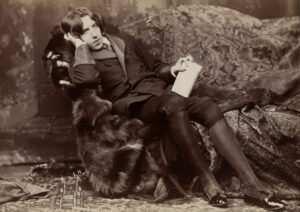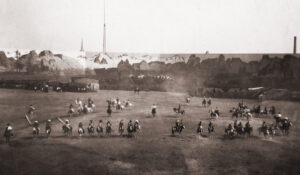Getting Away With Murder on the Texas Frontier: Notorious Killings & Celebrated Trials
by Bill Neal, Texas Tech University Press, Lubbock, $27.95.
The Texas criminal justice system is well known today for being tough on perpetrators of violent crime. There are currently 376 convicted felons on death row, far more than any other state in the union, and capital murder cases proceed through the Texas state court system with a speed unimaginable in other parts of the country. (Delaware does put more criminals to death per capita.) Yet, as author Bill Neal makes clear in Getting Away With Murder on the Texas Frontier, this wasn’t always the case. Across the harsh sagebrush of west Texas during the late 1800s, when enterprising district attorneys first ventured into former Comanche country with tattered copies of the Texas statute book in hand, the odds were nearly always stacked against the state attaining a guilty verdict against a suspected murderer.
Each chapter in Neal’s book is an expertly spun yarn of murder unpunished. Frontier Texas juries were simply averse to putting a person away for committing murder—horse thieves were much more likely to receive proper (and often excessive) punishment through the courts. In one case a mother attempts to gun down her daughter’s unfaithful husband after her daughter’s mysterious death from strychnine poisoning. She kills his father instead (popular state senator Steve Bell, no less) but is found innocent based on the Victorian precept that no woman could act with malice aforethought, and so her lascivious son-in-law must have driven her to temporary insanity. The revenge motive was often all a west Texas jury needed to exonerate a defendant, especially after impassioned defense appeals to the sanctity of domestic relations and the higher calling of family honor. In Knox County, three successive murders based on a cheating wife, a jealous husband and revenge-seeking family members all resulted in not-guilty verdicts for the rival perpetrators, even one who literally walked into the courtroom and gunned down his brother’s killer along with a sheriff and defense attorney.
Texas jurors’ bias toward the defense sometimes even allowed hardened criminals to escape justice. In 1896 two lesser Doolin Gang members were indicted for the murder of Sheriff Tom T. McGee during a botched robbery attempt on a Wells Fargo train in Canadian, Texas. In both trials the accused walked, despite overwhelming eyewitness testimony, after “anything goes” defense attorneys managed to suborn perjury, solicit affidavits that were knowingly false, buy witnesses and even buy a juror.
Sometimes lighthearted courtroom hijinks played into the defendant’s hands. When an overbearing Motley County judge decided to vacate his seat during a young defense attorney’s closing arguments, the judge’s bird dog jumped into his place, prompting a remark from the judge that the dog was good enough to hear the argument. But the attorney deftly countered with free verse poetry about dogs that so impressed the jury, it found the defendant not guilty through the sheer eloquence of the “underdog” lawyer.
In the opening chapter Neal frames these individual murder cases with a convincing attempt to answer the big question: Why did early Texas courts fail to convict murderers with such regularity? The author explores the cultural underpinnings of frontier Texans’ curious ambivalence to violence, which stemmed from their adherence to the Old South’s Code of Honor and a pervasive numbness to killing carried by veterans of the American Civil War. For Southerners of both the English and Scotch-Irish persuasion, self-respect always demanded much fighting for honor’s sake. In the courtrooms this translated into the “unwritten law” defense. Defense lawyers could and did argue forcefully that the highest test of any civilization was not its regard for human life, but its regard for the sanctity of domestic relations and a man’s right to vindicate his family or himself. The unwritten law defense, coupled with “the sorry SOB needed killing anyhow” defense, meant an acquittal for the defendant nearly every time.
Texas author Neal, who spent half of his 40-year professional life as a district attorney and the balance as a criminal defense lawyer, ends with a telling warning on the dangers of such jury nullification. Citing not-guilty verdicts in two major late-20thcentury trials—of the four police officers who violently beat Rodney King and of O.J. Simpson—Neal maintains that jurors’ disregard for existing laws when deciding guilt or innocence “is nothing more than a step backward toward the law of the jungle.” Jury nullification is a slippery slope toward the kind of lawlessness that existed on the late-19th-century frontier of west Texas—a time of vigilantism, mobocracy, revenge killing, murder-for-hire and violent family feuds.
Originally published in the February 2008 issue of Wild West. To subscribe, click here.




